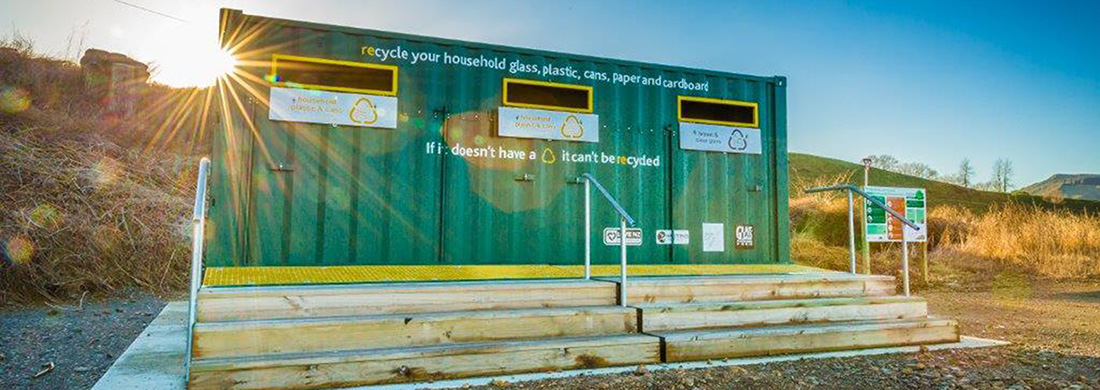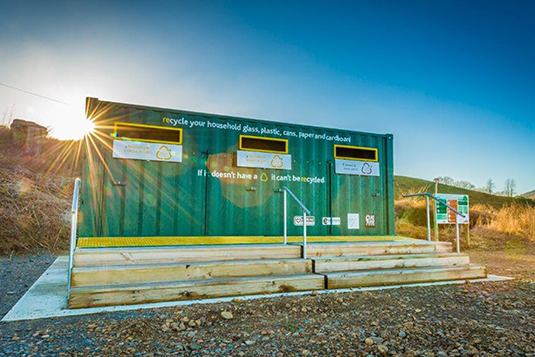
Latest funding sees $100k impact over 3k tonnes of glass a year

The latest Glass Packaging Forum grant funding round saw over $101,000 awarded to seven grants focused on improving glass recovery, storage and transport around New Zealand. Collectively this funding will have a positive impact on around 3,100 tonnes of glass a year.
Western Bay of Plenty District Council
In great news for their rural communities, the council, which moved to a glass separate collection system in 2021, is rolling out a rural recycling collection system. It will be using purpose-built recycling trailers, and the grant of $12,000 from the GPF will help fund one of them.
A six-month trial of a trailer held by the Western Bay of Plenty council showed good uptake, with 21 tonnes of colour-sorted glass collected. The trailers will also collect plastic, tins, paper and carboard.
Waitaki Resource Recovery Trust
An increase in freight costs meant the Trust has had to change its shipping method, which requires increasing storage capacity.
The site the Trust operates is vital to the movement of large quantities of glass from the South Island to Auckland, aggregating around 600 tonnes of high-quality, colour-sorted cullet a year. It processes all the glass for the Waitaki District as well as from the Palmerston District. It expects an increase of 60 tonnes a year due to the Waitaki District Council planning to separate glass at its rural transfer stations.
A grant of $38,492 will allow the Trust to continue its important work recycling South Island glass.
Rotorua District Council
The council wants to create recycling options for rural residents in the Rotomā and Rotoiti lakes areas which don’t have kerbside collections. While kerbside collection isn’t viable due to travel dissonances and population fluctuations, public place glass recycling bins would enable residents and holiday makers to recycle glass rather than send it to landfill.
A grant of $6,390 means the council can install recycling bins, which then feed into the established glass recycling network in the Rotorua area.
Ben Ohau Golf Club
The golf club is aiming to eliminate glass from going to landfill (as part of its zero waste to landfill goal) by installing five glass recycling bins around the nine-hole course along with two at the clubhouse.
Currently the club sends all glass to landfill as it lacks the resources to sort the glass from general waste. A grant of $4,784 means the small club will be able to keep glass out of landfill and instead have it go to Auckland for recycling into new containers.
Waikato District Council
The council has leased a new site for a recycling sorting facility for kerbside collections due to the old site not being fit for purpose, causing contamination from detritus.
A grant of $20,000 will help the council construct new, purpose-built storage bunkers for the 1,600 tonnes of glass it processes each year.
EcoCentral
The company plans on trialling sending glass, which would have otherwise gone to roading or drainage, to the glass aggregation hub at 5R Solutions in Christchurch. This will then go on to Auckland for recycling into new containers.
The trial will use one of EcoCentral’s transfer stations, and if successful will see the new glass flow expanded to its two other stations. This would represent between 360 and 600 tonnes of glass a year.
A grant of $37,500 meant EcoCentral can buy forklift tipper bins to handle the colour-sorted glass.
Thames-Coromandel District Council
The council wants to offer afterhours recycling through a new public place recycling container at its new Whitianga Refuse Transfer Station.
A grant of $20,000 will enable the council to install the container, a similar version of which is used successfully in Hawke’s Bay and Marlborough, and which allows colour-sorting of glass at source. The grant will help address the substantial increase in glass over peak holiday periods and it’s expected some 350 tonnes of glass will be collected annually.


